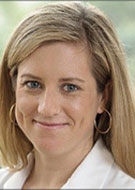Your Donations in Action: Elizabeth Sutton, MD
Percutaneous Breast MRI Biopsy as an Alternative to Surgery in Diagnosing a Complete Pathological Response Post Neoadjuvant Chemotherapy

The goal of treating operable breast cancer with neoadjuvant chemotherapy (NAC) is a pathological complete response (pCR). Clinical practice guidelines indicate that women who undergo NAC for operable breast cancer must still undergo surgery. However, when women learn post-surgery that they had a pCR, they question whether surgery was necessary.
In her 2016 Guerbet/RSNA Research Scholar Grant project, Elizabeth Sutton, MD, associate attending breast radiologist at Memorial Sloan Kettering Cancer Center in New York, and colleagues conducted a prospective clinical trial evaluating the use of MRI-guided biopsy as an alternative to surgery in women with breast cancer who have had a pCR to NAC on MRI.
The researchers looked at MRI-guided biopsy accuracy in pCR diagnosis after NAC compared with reference-standard surgical resection in an initial cohort of 20 patients.
The primary end point was the negative predictive value of MRI-guided biopsy, with true-negative defined as negative results of the biopsy corresponding to a surgical pCR.
At the completion of the grant, MRI-guided biopsy had a negative predictive value of 92.8%, with accuracy of 95%, sensitivity of 85.8%, positive predictive value of 100%, and specificity of 100% for pCR, defined as no residual invasive cancer.
The results showed that MRI-guided biopsy is promising for replacing surgery and more accurate than ultrasound and stereotactic-guided biopsy.
“If pCR can be confirmed by MRI without surgery, this has the potential to impact all younger generations, ultimately offering the possibility of saving their breasts,” Dr. Sutton said.
In early 2021, this research was published in the JAMA Network Open.
Dr. Sutton credits the grant with advancing her career by establishing a strong foundation for clinical research. As part of her grant, Dr. Sutton participated in the RSNA Advanced Course in Grant Writing, led by Gayle Woloschak, PhD. She recommends it for anyone looking to propel their research.
“I believe this course was a major determinant in my receiving both R21 and R01 funding from the National Institutes of Health (NIH) that has since led to my being invited to participate in several NIH study sections,” Dr. Sutton said.
For More Information
Learn more about R&E Funding opportunities.
Read last month’s Your Donations in Action article.